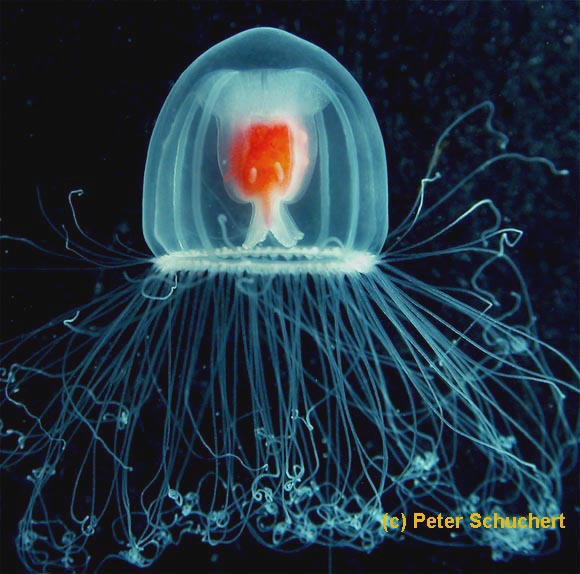Are We One Step Closer to Unlocking the Secret of Immortality?
A jellyfish that can turn back the biological clock

“Turritopsis rubra medusa; copright P. Schuchert” by Schuchert, Peter is licensed under CC BY-NC-SA 4.0. To view a copy of this license, visit https://creativecommons.org/licenses/by-nc-sa/4.0/?ref=openverse.
You may be familiar with the story of Juan Ponce de Leon, a Spanish explorer, famous for his legendary search for the Fountain of Youth. A species of jellyfish (called turritopsis dohrnii) seems to have beat him to the punch.
On August 29, 2022, a study called “Comparative genomics of mortal and immortal cnidarians unveils novel keys behind rejuvenation” was published on PNAS. The following words are an excerpt from that study:
Turritopsis dohrnii is the only metazoan able to rejuvenate repeatedly after its medusae reproduce, hinting at biological immortality and challenging our understanding of aging. We present and compare whole-genome assemblies of T. dohrnii and the nonimmortal Turritopsis rubra using automatic and manual annotations, together with the transcriptome of life cycle reversal (LCR) process of T. dohrnii. We have identified variants and expansions of genes associated with replication, DNA repair, telomere maintenance, redox environment, stem cell population, and intercellular communication. Moreover, we have found silencing of polycomb repressive complex 2 targets and activation of pluripotency targets during LCR, which points to these transcription factors as pluripotency inducers in T. dohrnii. Accordingly, we propose these factors as key elements in the ability of T. dohrnii to undergo rejuvenation.
That seems like a lot of scientific jargon, so let me break it down. At any stage of its life (from newly released to fully mature), the turritopsis dohrnii, under the conditions of sudden temperature change, reduction of salinity, starvation, or any kind of damage, is able to transform itself into a group of immature juvenile cells. This metazoan can turn back the biological clock repeatedly. There is no limit to how many times it can become young again, making it essentially immortal. Here is another paragraph from the aforementioned study:
Ontogeny reversal occurs in some cnidarian species, but this ability is usually lost once individuals reach sexual maturity. Only three species within the genera Turritopsis have been reported to rejuvenate after reproduction: Turritopsis dohrnii, Turritopsis sp.5, and Turritopsis sp.2. However, while the latter two sharply drop their reversal capacity after reaching maturity, T. dohrnii is the only one that maintains its high rejuvenation potential (up to 100%) in postreproductive stages, reaching biological immortality.
What this is saying is that while other species can turn back the biological clock, most can’t continue to do so after reaching maturity. And of the three that have this ability, two of them can’t even do it very often once they are mature medusae. Again, T. dohrnii is the only one that maintains its high rejuvenation potential (up to 100%) in postreproductive stages, reaching biological immortality. Hence, the immortal jellyfish.
The scientists hope that their studies will contribute to advances about human aging and initiatives to lengthen life expectancies, but don’t expect to be able to become immortal anytime soon. To quote Maria Pascual-Torner, “It’s a mistake to think we will have immortality like this jellyfish because we are not jellyfish. But it’s possible something in the immortal jellyfish’s evolutionary trick can be used to better understand the pathologies of aging.”
The study contained an important message about extending an organism’s health span (different from life span; it’s the years where you’re healthy), according to Dr. Jan Karlseder, who is the director of the Glenn Center for Biology of Aging Research at the Salk Institute, and a molecular biologist.
Dr. Karlseder added, “The most interesting thing is that it’s not a single molecular pathway…It is a combination of many of them. If we want to look for an extension of healthspan, we cannot just focus on one pathway. That will not be sufficient. We need to look at many of them and how they synergize.”
RELATED ARTICLES:
https://www.science.org.au/curious/earth-environment/animals-can-live-forever
https://en.wikipedia.org/wiki/Turritopsis_dohrnii
https://www.pnas.org/doi/full/10.1073/pnas.2118763119
https://interestingengineering.com/science/immortal-jellyfish-human-aging-research
https://greekreporter.com/2022/09/08/secrets-immortal-jellyfish/
TAKE ACTION:
https://immortal-jellyfish.com/














